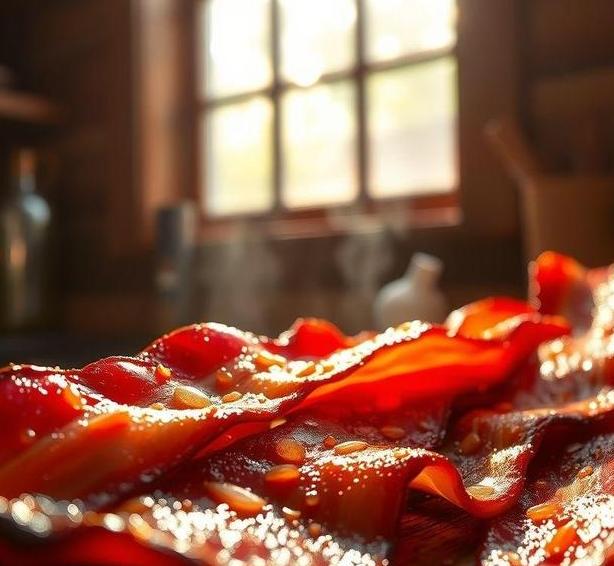Bacon is one of those foods that has a near-mythical status. It’s the crispy, savory delight that graces our breakfasts, sandwiches, and everything in between. But here’s the thing-fresh bacon, while delicious, doesn’t last forever. Whether you’re buying a slab to slice yourself or getting it pre-sliced, knowing how to handle fresh bacon is essential to avoid any nasty surprises when you go to cook it.
When it comes to fresh bacon, it’s important to understand that it’s not a shelf-stable product like its cured and cooked counterparts (think of those crispy pre-packaged bacon strips that are ready to eat). Fresh bacon, by its nature, is perishable and must be treated with care. In this guide, we’ll break down everything you need to know about fresh bacon, from whether it can go bad to how to store it properly, and even how to spot the signs of spoilage. Let’s dive in!
Can Fresh Bacon Go Bad?
Yes, fresh bacon can absolutely go bad. Just because bacon is a product that’s been through a curing process doesn’t mean it’s invincible. While curing helps preserve the bacon to a certain extent, it doesn’t stop it from spoiling entirely. In fact, the "fresh" part of fresh bacon means it hasn’t undergone full curing and smoking, which is why it’s far more sensitive to temperature and time than the fully processed bacon we might be more familiar with.
Here’s why it can spoil:
- Bacteria Growth: Fresh bacon, being raw, is a prime target for harmful bacteria like Salmonella or E. coli if not stored or handled properly. These bacteria can multiply rapidly, especially at warmer temperatures.
- Moisture Content: Bacon retains a lot of moisture, which can accelerate the spoilage process if left unchecked. The combination of moisture and raw meat creates the perfect breeding ground for bacteria.
- Oxidation: Over time, bacon can also oxidize, meaning the fats in the bacon react with oxygen in the air, which leads to unpleasant flavors, discoloration, and spoilage.
So, to sum it up: Yes, fresh bacon can go bad, and it’s something you definitely want to keep an eye on. But don’t worry, with the right storage techniques and a little awareness, you can extend its life significantly!
Shelf Life For Fresh Bacon

The shelf life of fresh bacon varies depending on a few factors, such as the date of purchase, the way it’s stored, and whether it’s been opened. Here’s what you need to know about how long fresh bacon typically lasts:
-
Unopened Fresh Bacon (Refrigerated)
Generally, fresh bacon that’s unopened will last about 1 week beyond the sell-by date when stored in the fridge. Some bacon brands may have preservatives that extend this a little longer, but it’s always best to check.
-
Opened Fresh Bacon (Refrigerated)
Once opened, fresh bacon should be cooked or consumed within 1 week. While the bacon might still look and smell fine after this period, it’s best to err on the side of caution and not take the risk.
-
Frozen Fresh Bacon
If you’re not planning to use your fresh bacon within the week or so, freezing it is a great option. Bacon can last for up to 6 months in the freezer without significant loss of quality. However, the texture might change slightly upon thawing, so it’s best to use frozen bacon for cooking or baking rather than eating it raw.
Common Signs Of Spoilage
Even though you might store fresh bacon carefully, sometimes spoilage happens. It’s important to know what to look for to avoid consuming bacon that’s gone bad. Here are the common signs of spoilage to keep in mind:
-
Smell
Fresh bacon has a distinctive salty, smoky smell. If the bacon starts to smell sour, rancid, or just “off”, it’s a clear sign that it’s past its prime. Trust your nose-if it doesn’t smell right, don’t risk it.
-
Color
Fresh bacon typically has a pinkish-red color with white streaks of fat. If the bacon has turned a dull brown or gray, it could be spoiled. You might also notice darker patches or discoloration where the meat has begun to oxidize. This is a warning sign to discard it.
-
Slimy Texture
If the bacon feels slimy or sticky when you touch it, it’s likely spoiled. Fresh bacon should feel firm and a little greasy (but not slimy). A slimy texture means bacteria are starting to break down the meat.
-
Discoloration In The Fat
Fat that has turned a yellow or off-white color may indicate spoilage, especially if the bacon has been stored improperly. Fresh bacon fat should be creamy white or slightly translucent.
-
Excessive Moisture
Fresh bacon may have some moisture in its packaging, but if it’s overly wet and there’s liquid pooling around it, this can indicate bacterial growth. It’s a good idea to discard bacon if it’s overly wet or soggy.
How To Store Fresh Bacon?
Proper storage is the key to extending the life of fresh bacon and preventing spoilage. Here’s how to store fresh bacon based on whether it’s opened or unopened:
In The Refrigerator

-
Unopened Fresh Bacon
Store it in the original packaging in the coldest part of the fridge (usually the back). If the package is damaged or you’ve already opened it, transfer it to an airtight container or resealable plastic bag to prevent air from getting in.
-
Opened Fresh Bacon
Wrap the bacon tightly in plastic wrap, aluminum foil, or a resealable bag. You can also place it in an airtight container to help minimize exposure to air. Always press out as much air as possible before sealing it to maintain freshness.
In The Freezer
-
Freezing Fresh Bacon
For longer storage, you can freeze fresh bacon. Wrap individual slices or a whole slab tightly in plastic wrap, followed by a layer of aluminum foil. Alternatively, you can place the bacon in a vacuum-sealed bag or a freezer-safe plastic bag. Label the bag with the date, so you know how long it’s been stored.
-
Thawing Frozen Bacon
To thaw, place the bacon in the refrigerator overnight. Never thaw bacon at room temperature, as this can encourage bacterial growth.
Expert Tips
To ensure that your bacon stays fresh for as long as possible, here are some expert tips:
-
Keep Bacon Cold
Always store bacon in the fridge or freezer immediately after purchase. Bacon thrives in a cold environment and can deteriorate quickly at room temperature.
-
Don’t Leave Bacon Out Too Long
Never leave fresh bacon out for more than two hours at room temperature. This creates a breeding ground for bacteria. If the room temperature is above 90°F (32°C), reduce the time to 1 hour.
-
Use A Vacuum Sealer
If you frequently buy fresh bacon in bulk, consider investing in a vacuum sealer. This removes the air from the packaging and extends the shelf life by limiting exposure to oxygen.
-
Re-wrap Bacon After Use
If you’re using part of a package and want to save the rest, be sure to wrap the unused portion tightly. If you don’t plan to use it soon, freezing is always a good backup plan.
FAQs
How Long Can Fresh Bacon Stay Good In The Fridge?
Fresh bacon can typically be stored in the fridge for up to one week. However, for the best quality, it should ideally be used within 5 to 7 days of purchase. Always check the expiration date on the packaging for more accurate guidance.
Can Fresh Bacon Go Bad If It’s Left Out At Room Temperature?
Yes, fresh bacon can go bad if left out at room temperature for more than two hours. Bacteria can start to grow rapidly in the ’danger zone’ between 40°F and 140°F (4°C to 60°C), which increases the risk of foodborne illness.
How Can I Tell If Fresh Bacon Has Gone Bad?
Signs that fresh bacon has gone bad include a sour or rancid smell, slimy texture, and a change in color (often turning grayish or brown). If the bacon feels sticky or excessively wet, it’s best to discard it.
Can Fresh Bacon Be Frozen To Extend Its Shelf Life?
Yes, fresh bacon can be frozen to extend its shelf life. When properly stored in an airtight container or freezer bag, bacon can last in the freezer for up to six months without a significant loss in quality.
What Is The Best Way To Store Fresh Bacon?
To store fresh bacon, keep it in its original packaging if unopened. Once opened, wrap the bacon tightly in plastic wrap or aluminum foil and place it in an airtight container or a resealable bag. This helps prevent the bacon from absorbing odors and losing quality.
Is It Safe To Eat Fresh Bacon Past Its Sell-by Date?
The sell-by date on bacon is an indicator for retailers and not a strict expiration. However, it’s important to assess the bacon for signs of spoilage, such as an off smell or unusual color, before deciding if it’s safe to consume.
Can Cooking Fresh Bacon Make It Last Longer?
Cooking fresh bacon does extend its shelf life slightly. Cooked bacon can be stored in the refrigerator for about 4 to 5 days, while cooked bacon that’s frozen can last for up to 1 to 2 months.
What Happens If I Eat Bad Bacon?
Eating bad bacon can lead to foodborne illnesses, as spoiled bacon can harbor harmful bacteria such as Salmonella or Listeria. Symptoms of food poisoning may include stomach cramps, vomiting, diarrhea, and fever.
Can Bacon That Is Past Its Sell-by Date Be Used If It Has Been Frozen?
If bacon has been frozen before the sell-by date and was properly stored, it is generally safe to eat after thawing. However, the texture and flavor may be compromised if it has been frozen for too long.
Does Bacon Need To Be Refrigerated Immediately After Purchase?
Yes, fresh bacon should be refrigerated as soon as possible after purchase to slow bacterial growth and preserve its freshness. If you don’t plan to use it within a week, freezing it is a good option to maintain quality.